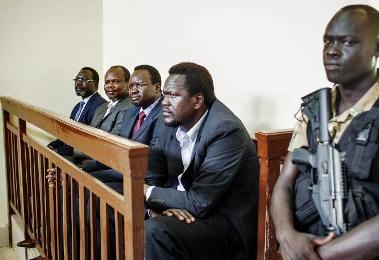S. Sudan rebels say former detainees may decide on which party to join in conflict
June 27, 2014 (ADDIS ABABA) – The armed opposition faction of the Sudan People’s Liberation Movement (SPLM in Opposition) has revealed signs of deciding moments by members of the SPLM former detainees to join either side of the six-month old political conflict in South Sudan.

While Mabior did not name the politician or those willing to join the rebel group, there are similar speculations that others may also decide to join the government, citing recent meetings conducted between president Kiir and some of these leaders on the sidelines of the IGAD summit last week in Addis Ababa.
The former detainees have previously preferred to stay neutral or participate in the talks as the third bloc, despite the fact that they were politically allied to the former vice president, Riek Machar, in which they together held the 6 December press conference, accusing President Salva Kiir of “dictatorial tendencies.”
The group includes former SPLM secretary general, Pagan Amum, national ministers: Deng Alor, John Luk, Kosti Manibe, Gier Chuang, Majak Agot, Madut Biar, Oyai Deng, Cirino Hiteng; former Lakes state governor, Chol Tong and Ezekiel Lol, former South Sudanese diplomat to US.
After the 15 December violence, which they all alleged was started by president Kiir, they were all arrested, counter-allegedly for attempting a coup with Machar. The rebel leader demanded their release as a precondition for further negotiations with the government to end the crisis.
They were however subsequently released in two groups of 7 and 4; the latter due to lack of evidence presented in court.
Upon gaining their freedom, the group has been trying to participate in the negotiations as a neutral body, but with insignificant impact as their role is being reduced to consultations with either party or the mediation in order to sell their views.
In the course of their neutrality position the group also earned criticisms by South Sudanese rebels and some Kenyan MPs who described them as “opportunists” and “selfish.”
Machar’s supporters accuse the g-11 of betrayal over their reluctance to join the war “imposed on them.” They in particular accused the SPLM former secretary general, Pagan Amum, of allegedly uttering that the killing of the thousands of the Nuer civilians in Juba did not deserve a war, a remark Amum dismissed immediately.
Amum in a statement released last May explained their decisions to not joint the rebels simply means they refuse to be part of the war.
He said that being members of the third bloc does not equate to being neutral in the current conflict, stressing they are part of the peace talks and part of any future government that would bring about political reform within the country.
“Both the government and armed rebels prefer a military solution but we in the third bloc fully support the IGAD peace process as the best alternative to the war in our country,” wrote Amum, adding “This makes us more than neutral bystanders: we are not part of the bloodshed, but of the sustainable solution”.
However Amum and his group were accused of playing the “good guys”, and plan to lead the proposed interim government with the support of the international community.
On 19 June, Salva Kiir rejected any such plans saying that he would not accept any government without him, the elected president, and accused unnamed countries of intending to dismantle the newly independent South Sudan and the ruling SPLM.
“They intend to constitute a transitional government without me as the elected President. They want to bring somebody of their choice to be the president of that transitional government. That is a red line,” said Kiir.
The expected declaration by the group members to take sides between the rebels and government, if it happens, is seen as the beginning of their melt down.
(ST)
